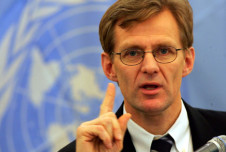It’s easy to be overwhelmed by huge moral issues that we feel powerless to resolve. Ethics scandals riddle Congress, death tolls rise in Iraq, the gap grows between rich and poor, our planet faces the prospect of catastrophic climate change—and what can we do? No matter how much these problems upset us, their solutions seem beyond our control.
Yet this sense of powerlessness can blind us to the moral dimension of our own everyday lives, whether it concerns what to eat, what to drive, or how to treat our friends and neighbors.
These are the choices of “everyday ethics,” the theme of this issue of Greater Good. While the academic field of ethics engages with abstract questions of morality, everyday ethics focuses on the ordinary, sometimes banal decisions we all make in our daily lives. But as the articles in this issue make clear, these seemingly mundane choices have far-reaching effects on the well-being of others, and they speak volumes about the values that define us as individuals and as a society.
In the first essay, Joshua Halberstam explains why it can be so hard to arrive at ethical responses to some of life’s everyday problems, especially when any possible decision presents costs as well as benefits. His analysis offers a constructive approach to these situations in which there’s no clear distinction between right and wrong.
No choice is more a part of our everyday lives than deciding what to eat. Yet our food choices affect everything from the condition of the planet to the treatment of livestock to the finances of farmers and corporations around the world. Given the scope and the complexity of the ethics of eating, this issue features two articles on the subject, highlighting the work of two seminal authors in this area: philosopher Peter Singer and journalist Michael Pollan.
Singer helped jumpstart the animal rights movement a generation ago with his book Animal Liberation. Here, along with co-author Jim Mason, he tackles one of the next frontiers of ethical eating: the question of whether we have a moral duty to support local farmers and eat food that’s grown close to where we live. Their essay sheds light on the global effects of some of our most personal choices.
Pollan’s reporting reveals the hidden truths about where our food comes from and how it’s produced. In an interview, he discusses the complicated—and sometimes conflicting—ethical issues that are shrouded by equally complicated food labels.
Illegal immigration has increasingly become a topic of everyday conversation for Americans. Yet we rarely have open discussions about the ethical issues behind the headlines and political rhetoric. Carolyn Pinedo Turnovsky addresses these issues, considering what ethical obligations—if any—employers have to the undocumented workers they hire. Drawing on three years of research observing day laborers on a New York City street corner, she identifies how ethics can play a role even in relationships that are technically against the law.
To ensure that we make ethical decisions on the job, in the supermarket, or anywhere else, it helps to hone our ethical instincts, ideally from the time we’re young. Noted education theorist Nel Noddings explains in her essay how we can nurture ethical decision making skills in children—tools they’ll need for the rest of their lives.
As Noddings and the other contributors illustrate, it’s often unclear what the “right” decisions are in matters of everyday ethics. What’s more, we usually won’t face any immediate and dire consequences for making a “wrong” choice. But the significance of everyday ethics extends beyond the effects of any single decision. As Rabbi Jonathan Sacks explains in his essay, the guiding principles of everyday ethics reinforce our understanding of what it means to lead a good, moral life: treating others with respect, even if they’re strangers who we’ll never meet again; recognizing the connections between our actions and the welfare of others, even if they live on the other side of the planet; trying to give more to the world than we take in return.
Of course, these principles do more than endow an individual’s life with meaning and purpose; they also provide the basis for peaceful and cooperative relationships between people, groups, and even nations. In this light, the contributors to this issue of Greater Good remind us that the moral state of the world is not beyond our control. It’s a product of the countless ethical decisions we all make, one day after another.





Comments